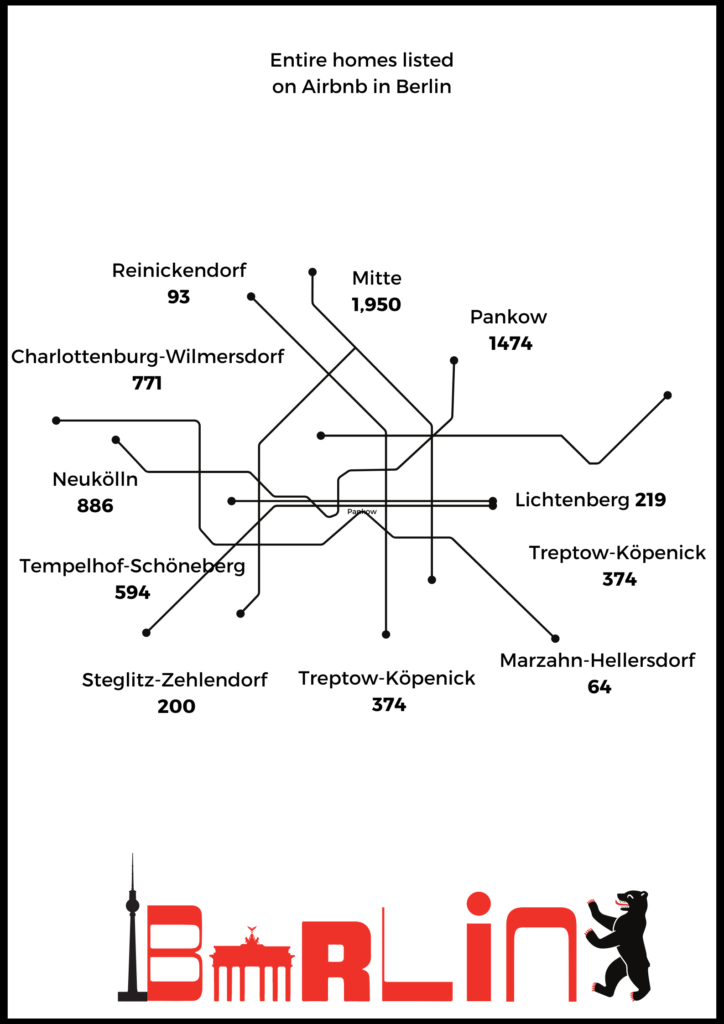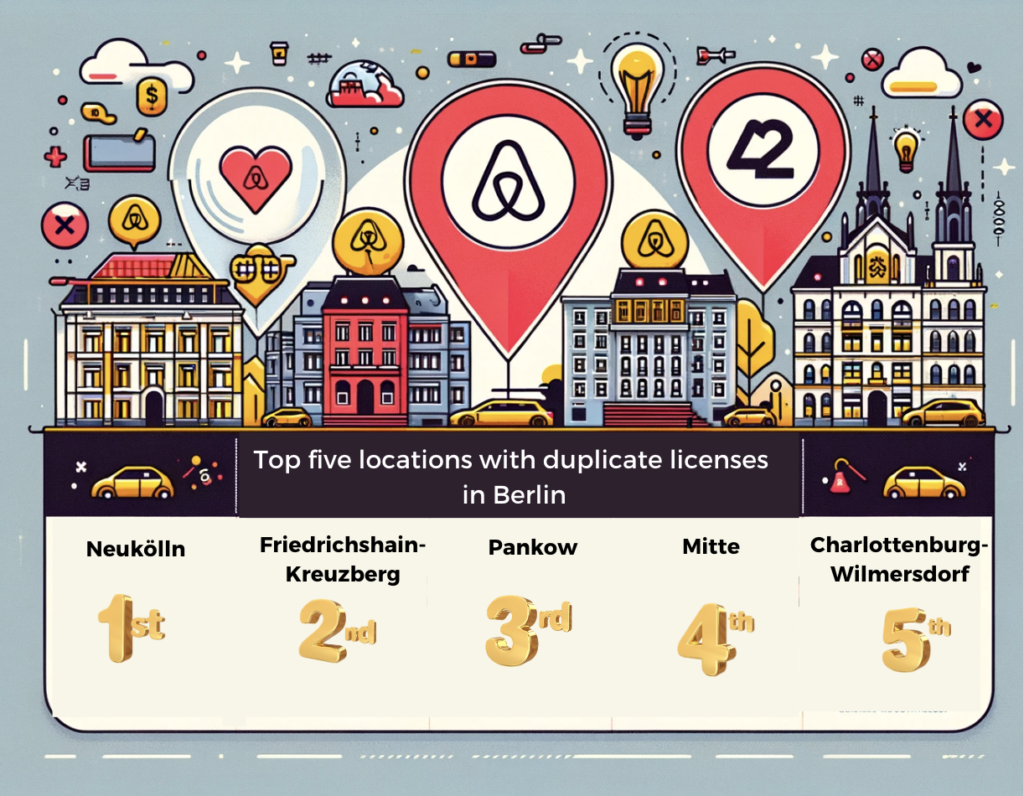In the heart of Europe, Berlin confronts an ongoing dilemma: the proliferation of illegal Airbnb rentals. Despite regulations implemented in 2016 to curb short-term rentals and alleviate housing shortages, the city’s struggle persists.
This analysis delves into the current state, challenges, and implications of Berlin’s Airbnb ban.
The city has made significant strides in regulating the platform and ensuring hosts adhere to local laws.
Rules introduced in 2016 led to a 40% decrease in available Airbnb listings (although they did creep back up a few months later)
Source: Karat-blog.jonasparnow.com
As of now, Berlin hosts 13,134 Airbnb listings, with 8,431 being entire homes, the rest being private room, shared room or hotel.
The listing volume is a lot because Airbnb is now a leader in furnished mid-term rentals (over 92 days), which require no license and are beneficial for various reasons, including new residents moving to Berlin.
A notable point is that 86.9% of hosts manage only one listing, suggesting there is still less professionalism in this sector, which is a positive sign as the data shows Airbnb is still very much part of the sharing economy.
James from Berlinbnb.co says, ‘A significant concern is the prevalence of license duplication, where multiple listings are operating under a single license, circumventing regulations.
This analysis explores how this loophole affects Berlin’s rental market and the broader implications for housing availability and community integrity.
There are 13,134 Airbnb listings in total.
Listings Split by Room Type:
- Entire home/apt: 8,431 listings
- Private room: 4,309 listings
- Shared room: 262 listings
- Hotel room: 132 listings
Among these, 7,878 listings offer stays for under 92 days
For this purpose, we exclude private rooms, shared rooms, and hotel rooms because you can rent these spaces out on Airbnb without a license, as they are either commercial or less than 50% of living space. It’s worth noting that hosts could list their apartments under the wrong category.
There are 5,301 listings that are categorized as “Entire home/apt” and offer stays of under 92 days.
In the filtered dataset focusing on “Entire home/apt” listings with a minimum stay of under 92 days, there are 478 hosts who have more than one listing.
- Only 13.98% of the hosts have more than one property listed which is in line with the whole data.
- Less than 5.26% have more than three properties listed.
- 0.26% have more than twenty properties listed.
Listings by the Same Host:
- Most hosts (approximately 86.9%) have only 1 Airbnb listing.
- 7.4% of hosts have 2 listings.
- The percentage of hosts decreases as the number of listings they run increases. For example, only about 0.02% of hosts have 20 listings, and it’s even rarer for hosts to have more than 20.
Airbnb has not ‘professionalized,’ and many residents still use it to supplement their income.
QUOTE
“Airbnb has helped me supplement my income, but I’ve had to adapt to the new rules and be very careful not to break any regulations.”
Host (Single mother living in Berlin)

| Neighborhood | Entire home/apt | Hotel room | Private room | Shared room |
|---|---|---|---|---|
| Charlottenburg-Wilmersdorf | 771 | 28 | 402 | 8 |
| Friedrichshain-Kreuzberg | 1,745 | 8 | 1,082 | 36 |
| Lichtenberg | 219 | 4 | 120 | 2 |
| Marzahn-Hellersdorf | 64 | 0 | 42 | 0 |
| Mitte | 1,950 | 37 | 770 | 76 |
| Neukölln | 886 | 0 | 655 | 14 |
| Pankow | 1,474 | 24 | 547 | 13 |
| Reinickendorf | 93 | 0 | 102 | 7 |
| Spandau | 61 | 8 | 46 | 92 |
| Steglitz-Zehlendorf | 200 | 0 | 103 | 3 |
| Tempelhof-Schöneberg | 594 | 23 | 294 | 7 |
| Treptow-Köpenick | 374 | 0 | 146 | 4 |
The following data includes listings for the whole apartment and excludes a minimum night stay of 92 days because mid-term rentals are allowed and needed given the registration (anmeldung) situation.
Airbnb License Numbers Analysis
There are two options on the Airbnb platform.
- Berlin provides a license number. This is generally people who want to rent their apartment out for 90 days max over a 12-month period or any other reason.
- The addresses listed in the data indicate a commercial property.
The data shows:
- 2,698 listings with a license number.
- 2,592 listings with an address in the “license” column.
- 11 listings with missing (blank) data.
Nearly all listings in this category have provided a license number or address, with only a few missing license information.
Removing addresses and blank data and digging into only license numbers shows that 165 listings have duplicate license numbers.
Upon checking the entire dataset of listings (listings over 92 days min stays, private rooms, shared rooms), there are 614 listings with duplicate license numbers. This count includes all instances of duplicates across the full dataset, not limited to the previously filtered subset.
A majority of the duplicates are being used by the same host (for example, they have five listings and use the same number across them all). Duplicate numbers are also being shared by different hosts on the platform.
The top five locations with duplicate license numbers are:

- Neukölln – 120 occurrences
- Friedrichshain-Kreuzberg – 117 occurrences
- Pankow – 103 occurrences
- Mitte – 77 occurrences
- Charlottenburg-Wilmersdorf – 45 occurrences
Risk vs Reward of Operating an illegal Airbnb in Berlin
One of the primary considerations while operating an Airbnb in Berlin is the strict regulations governing short-term rentals. Compliance with these regulations is crucial, as failure to do so can result in hefty fines and, in some cases, the loss of property rights.
Despite these risks, many property owners are drawn to the potential profitability of short-term rentals compared to traditional renting options.
To provide a clearer picture of the financial implications of short-term rental profitability, Airbnb property represents an 84% profit increase compared to the profit from the mid-term rental and a lot more from a regulated long term rental.
Taking the average rental price in Berlin, estimated at €1200 per month for a furnished 40sqm apartment, we can compare this with the average Airbnb property’s income data from Airbtics.
| Income Source | Average Monthly Income |
| Mid Term Rental | €1,200 |
| Airbnb Property | €2,233 |
Guests are also affected by the impact of Berlin Airbnb regulations, as they may face limited rental options and increased booking cancellations. These limitations have arisen due to the fact that many hosts operate without proper permits, resulting in last-minute cancellations for guests who unknowingly book with these unauthorized hosts.
“As a traveler, I always check if the Airbnb listing in Berlin has a registration number. It gives me peace of mind that I won’t face any issues during my stay.”
As a major player in the global sharing economy, Airbnb has undeniably contributed to Airbnb’s job creation in areas all over the world – (data I’m working on estimating the average job creation an Airbnb has in an area).
The platform has played a key role in stimulating tourism and creating the much under-discussed jobs it has created in tourism, restaurants, along with operations such as cleaning and property management, along with general economic growth in the city.
FAQ
Are there still many illegal Airbnb apartments in Berlin?
Despite regulations and crackdowns, there are still illegal Airbnb apartments operating in Berlin. The city authorities continue to enforce regulations and impose fines to address the housing shortage and protect local communities.
However, in a city the size of Berlin, the problem is not out of control and very limited contribution to housing shortage squeeze.
What are the current regulations for Airbnb in Berlin?
Berlin’s Airbnb regulations require hosts to have a permit to rent out an entire property on a short-term basis. Second homes in Berlin are limited to 90 days of rental per year. By March 1, 2023, all Airbnb listings had to provide a registration number or host contact details.
How do Airbnb regulations in Berlin affect hosts and guests?
Hosts must secure permits and adhere to rental limitations, which may result in fewer rental options for guests. Visitors may also face cancellations if they book with unauthorized hosts.
How does Berlin’s housing shortage influence the legality of Airbnb?
The housing shortage in Berlin has prompted stricter regulations to ensure properties are not misused for short-term rentals, which can exacerbate the housing deficit.
What are the opinions of hosts and locals regarding Airbnb in Berlin?
Some hosts have adjusted to the regulatory environment, while locals express concerns about neighborhood disturbances and impacts on the housing market due to the proliferation of short-term vacation rentals.
Are there any statistics on Airbnb’s influence on the Berlin housing market?
Statistical data on Airbnb’s impact on the Berlin housing market is essential for understanding its effects on rental shortages and inflated prices, with regulations aiming to mitigate negative consequences. I used data from insideairbnb.com
How does Airbnb contribute to Berlin’s economy?
Airbnb contributes to the economy of Berlin through job creation and tourist spending. Still, its presence also impacts the community, leading to regulatory responses aimed at balancing the benefits with the need to protect local housing markets and neighborhood quality of life.
Where does the data come from?
I took the data from publicly available datasets on insideairbnb.com